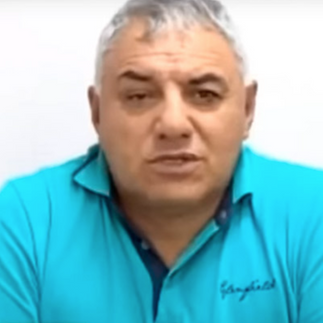Of the 14 people sentenced to life imprisonment in Tajikistan in 2022, 11 were natives of GBAO.
- textalisher
- Jan 29
- 3 min read
Last year, 14 people were sentenced to life imprisonment in Tajikistan, according to Radio Ozodi. Among them, 11 were natives of GBAO. For comparison, even ISIS fighters who fought in the region did not receive as many life sentences.
Akhliddin Melikzoda, head of the Statistics Department of the Supreme Court of Tajikistan, stated at a press conference in Dushanbe in February that 14 defendants were sentenced to life imprisonment last year—six more than in 2021.
Eleven of those sentenced to life imprisonment were natives of the Gorno-Badakhshan Autonomous Region (GBAO):
The eleven GBAO natives sentenced to life imprisonment:
Tolib Ayombekov
Munavvar Shanbiev
Kholbash Kholbashev
Gulomali Ayombekov (son of Tolib Ayombekov)
Khairimamad Dustmamadov
Aslan Gulobov
Niyozsho Gulobov
Najmiddin Sherdzhanov
Imomnazar Shoishirinov
Kulmamad Pallaev
Pakhlavon Sheraliev
The Tajik authorities accused them of terrorism, premeditated murder with aggravating circumstances, and treason. However, the families of those sentenced to life imprisonment believe they are innocent.
One of Tolib Ayombekov’s close relatives told Radio Ozodi that they were able to see him only once after the verdict was issued.
“Tolib stated that he does not agree with the verdict. He has served the state, and the president has awarded him medals twice. What troubles him most is that his son was also given a life sentence. He says that both he and his son consider themselves innocent. Their relatives are seeking a review of their cases, but lawyers are avoiding taking on their defense,” said our source.
Opposition politician Alim Sherzamonov considers the life sentences given to those arrested in connection with the events in GBAO to be unjust.
"The families have no information about the conditions in which the life-sentenced prisoners are being held. Not only has the Red Cross been denied access to them, but even the UN has been kept out. One of them, Imom Shoimshirinov, committed no crimes. He was a civil activist who never remained a passive observer when he witnessed officials violating the law. For several individuals I know personally, the courts have issued unjust sentences," says Sherzamonov.
"The courts merely determine the length of the sentence."
Experts believe that the increase in life sentences is part of the Tajik authorities' efforts to create an atmosphere of fear, thereby exerting pressure on opposition supporters and civil activists.
Jamshed Yorov, lawyer and head of the Buzurgmehr Foundation, states that trials against activists and opposition figures are held behind closed doors, raising serious doubts not only about the grounds for the charges but also about the investigation process and the fairness of the trials themselves.
"For example, whether the actions of a person accused of violently overthrowing the government actually contain elements of a crime is never truly examined. As is well known, Tajikistan lacks an independent judicial system, and courts generally align with the prosecution’s stance. In reality, during the trial, they merely determine the length of the sentence," says Yorov.
In Tajikistan, life imprisonment was introduced in 2004 following the abolition of the death penalty. It is applied only to a few articles of the Criminal Code of Tajikistan, including terrorism, premeditated murder with aggravating circumstances, treason, and rape of minors.
The exact number of people serving life sentences in Tajikistan remains unknown. As of July 2017, 80 people were serving life imprisonment in the country.
Currently, among those serving life sentences are:
Gaffor Mirzoev, former commander of the National Guard of Tajikistan
Sukhrob Langarev, brother of Langari Langariev, a well-known commander of the People’s Front
Saidumar Husaini and Mahmadali Hait, former deputy chairmen of the banned Islamic Renaissance Party of Tajikistan (IRPT).
"Life Prisoners Face Harsh Punishment for Any Violation"
The family of Mahmadali Hait, who has been serving a life sentence for eight years, has repeatedly complained about his conditions of detention and deteriorating health.
Firuz Mahmadali, Hait’s son, says that despite the harsh detention conditions, prisoners are severely punished even for minor rule violations.
"The detention conditions for my father and other life-sentenced prisoners are significantly different from those of other inmates. For example, regular prisoners are housed in cells with at least 3-4 people, while ‘lifers’ are subjected to much stricter confinement. They are only allowed two short visits per year with their relatives—strictly time-limited, under heavy security, and conducted through glass and a telephone receiver," added Firuz Mahmadali.
The Tajik authorities generally deny allegations of torture and mistreatment in the country's penal institutions.
In 2020, the Tajik government approved a prison reform program. The Penitentiary Reform Strategy of Tajikistan specifically noted that the number of life-sentenced prisoners in the country is increasing, yet there is no dedicated prison facility for this category of inmates that meets international standards. For several years, the authorities have reported to UN agencies that a new special prison for life-sentenced prisoners will be built in the Rudaki district.
Meanwhile, the families of life-sentenced prisoners fear that with the increasing number of politically motivated life sentences, detention conditions will become even more severe.
Article Originally Published at Radio Ozodi in Russian language.
_edited.png)














Comments